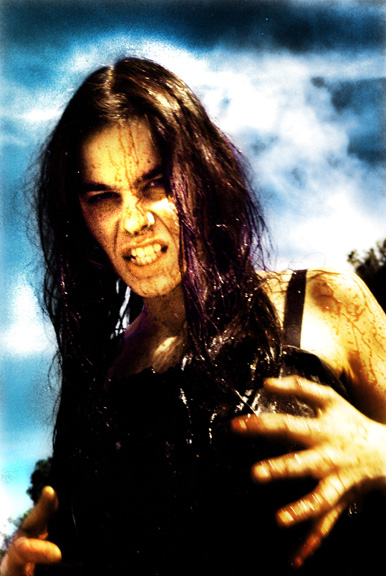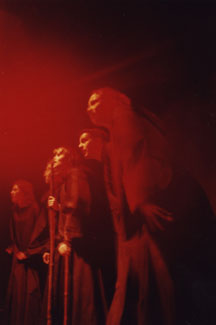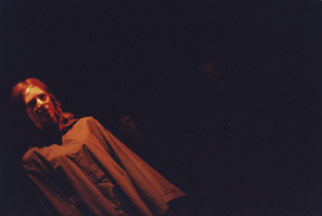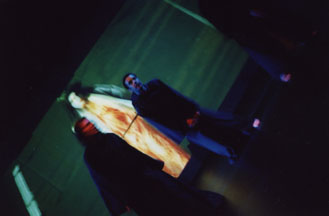 |
| Photograph by Willliam Earl |
 |
| Photograph by Willliam Earl |
the bacchae
The Bacchae centres around Dionysus,
god of theatre, wine and cheese, who sends all the Theban women in to
Bacchic trances and is known as one of the great Ancient Greek plays.
[Playing] until Saturday 15 November, 8pm shows, Bats Theatre
The Bacchanals company have transformed the play for today's audiences,
turning the choruses into musical interludes which, frankly, lost me a
bit at first, although the more the actors got in to it, the more I did
too. As part of the STAB season at Bats, the show explores multimedia,
with the whole prologue projected on to the stark white back wall of the
room. The rest of the play has this film element interspersed too. Waiting
for the next on-screen piece to come on throughout much of the play; the
detail of the film bits won me over more than the simple onstage setting.
It wasn't until a meaty part of the play that I really began to take notice
of the quality of the actors onstage, but the play ended just as I was
getting into it. The small cast each played many parts, and James
Stewart's subtle changes as he played two characters at once was a
highlight.
In need of a reason to drag a certain someone away from the World Cup? This
play has more blood and gore than you'll ever see at the rugby! You may
have studied The Bacchae, your
appreciation hindered by masks, boorish choruses or droning actors. Go and
see this version if you are one of those poor people, The Bacchanals are
excellent at appeasing your memories of dull renditions of this great play.
- Steph Walker,
The Package
Dionysus In Wellington Till Saturday
Bacchanals Do It Again
There's a moment in The Bacchanals' new production of Euripedes'
The Bacchae when Dionysus
(James Stewart) stops fucking around and decides to deal to Pentheus
(Alex Greig).
Grasping his arrogant young mortal relation by the shoulders, he stops
the play, and Pentheus, dead in their tracks. It's a pivotal moment
plot-wise, and is memorable also for being the only sustained silence of
the show. What's been happening up to that point? Well, what hasn't
happened?
 Making good on their press releases, the Bacchanals have already given us
more bang for our buck than even the most hopeful punter could have
expected: there have been exploding castles, we've seen some CGI, the
smoke machines have been working overtime.
Making good on their press releases, the Bacchanals have already given us
more bang for our buck than even the most hopeful punter could have
expected: there have been exploding castles, we've seen some CGI, the
smoke machines have been working overtime.
And yet, with all these effects (and the thrill of seeing the back wall
of Bats converted into a film-screen) nothing has ever threatened to take
the focus from the five actors standing right in front of us. I have seen
the show twice, and, despite the heavy use of film (which can't react to
an audience) I've seen two different shows. Such is the energy and
sensitivity of the cast.
The story is pretty simple, and knowing the whole thing back-to-front will
neither harm nor enhance your enjoyment of this production, which caters,
as all Bacchanals shows do, not to the theatre snob, but those in search
of a good night out. The fact that the company is helmed by director
David Lawrence, notoriously anal about such things as meter and preserving
full texts, means that said theatre snobs are not left fuming and crying
'Blasphemy!' either.
Up till now, perhaps. Lawrence has taken a bold step in subverting the
way the Greek plays are supposed to be performed by presenting most
reported events on the screen behind the messenger. So we see Pentheus
torn to shreds, we see the herdsman come across the bacchantes in the
wood, we even see Pentheus dress in drag in the few moments he's offstage.
Does it work? Well, yeah.
To a general audience, the combination will enhance understanding, and even
that theatre snob in the back will have to agree that the juxtaposition
of Euripedes' words and filmmaker Willy Earl's visuals is a powerful one.
If someone had told me a few years ago that James Stewart would one day
play Dionysus, I wouldn't have believed them, but this young actor is going
from strength to strength. Following his impressive work in last year's
Crave and this year's
The Collective, he brings a real
gravity to the godly role, sneering, shouting and silencing, his confidence
in the role is apparent from go to whoa. His turn as Agauë's father,
the founder of Thebes, is a nice piece of voice and physical work. Alex
Greig as Pentheus, too, is impressive, and weaves subtle humour into his
ferocious performance.
The Bacchae themselves couldn't have been better cast. Eve Middleton is
great as Agauë, and moves plausibly from hedonistic huntress to
broken-hearted mother as the play closes. The desperation with which she
tries (in vain) to wash her son's blood from her hands is as frenetic as
anything else in the eighty minutes of physical and emotional violence
 preceding it. Irene Flanagan and Julia Harrison complete the Bacchanals
Mk. 10, and really keep the wheels on the production.
preceding it. Irene Flanagan and Julia Harrison complete the Bacchanals
Mk. 10, and really keep the wheels on the production.
The set is empty save for a dish of water and the props are few. The new
translation is in crisp iambic pentameter and the cast's diction is fautless,
probably. The chorus parts are set to music, sometimes playing it straight,
sometimes using an up-beat jangle which belies the lyric. My only complaint
is that this maybe goes a little Godspell near the end, but well done
Walter J. Plinge and Evil M. Übercrave.
It was one of this project's aims to present an accessible production
of a Greek tragedy, but the Bacchanals have gone a step further, and given
us an hour-and-a-half of pure entertainment. It's clever, it's energetic,
and you're left in no doubt that the Bacchanals are to classical theatre
what Jimi Hendrix is to the blues.
- Jonathan Potts,
studentz.co.nz
Playthings of the gods
When the women of Thebes start worshipping Dionysus (variously known as the
god of ritual dance and sacred mysticism, of death and new life, of theatre,
wine and cheese, of poetry, song and drunken revelry), their king, Pentheus,
is not happy. He is especially upset that his mother, Agauë, has become
a high-priestess of bacchanalian excess.
Dionysus, disguised as a mortal, persuades Pentheus to dress as a woman in
order to check their mysteries out. But when he's discovered, the crazed
women tear him limb-from-limb and poor deluded Agauë brandishes his
head believing it to be a lion's until her dad, Cadmus, disabuses her.
As with all Greek tragedy, we mortals prove to be mere playthings of the
gods. We're punished for believing we can interfere in the forces of the
universe as they have ordained them. Maybe when Euripides wrote
The Bacchae more than 2,400 years
ago he was penning a cautionary tale for women who sought pleasures beyond
the service of men.
These days any bloke who has tried to unravel the mysteries of womanhood,
let alone infiltrate the feminist movement, may identify with Pentheus.
Likewise women who have got so carried away with being women they have
alienated themselves from half of humanity may sense a sisterhood with
Agauë.
It may put many in mind of the drug-induced atrocities that occur with
alarming frequency, these days, at the hands of people (mostly male) who
take P in their quest for a good time. One way or another
The Bacchae achieves its right
to be called a classic by proving that the more things change the more
they stay the same.
Directed by David Lawrence, this is The Bacchanals' offering for the
Bats Stab season. They deliver a powerful ninety minutes, performed by
five live actors and many more (led by Taika Cohen, Jocelyn Christian
and Hannah Deans) on film and digital video images (DOP, William J Earl).
A flickery, fuzzy and crackly black and white film prologue is followed
by contemporary colour sequences that extract today's women from the
 supermarket, kitchen, corporate meeting and cocktail party, and deliver
them to a timeless river-bed for the Dionysian revels.
supermarket, kitchen, corporate meeting and cocktail party, and deliver
them to a timeless river-bed for the Dionysian revels.
Except no-one gets any pleasure from it. There is no libidinous
carousing. It is a hedonism-free zone. James Stewart plays Dionysus on
a sustained single note of pathological intensity and the women's
entrancement is morbidly manic. Is this really how people party these days?
The only bit of relative levity comes when Pentheus (Alex Greig) baulks
at dressing in drag. Irene Flanagan's Teiresias also releases the
tension somewhat. But more could be done to give dramatic shape and
texture to the play, and value to the strength and commitment everyone
(including Julia Harrison) brings to their work.
Only in the penultimate scene does the pressure ease sufficiently to
admit a subtlety that affords real insight. Eve Middleton is riveting
as her possessed Agauë comes face-to-face with the enormity of it
all. The utter veracity of the severed head (made by Carlos Wedde and
Gareth Jenkins) must also be given due credit here.
More light and shade in pace and tone would go a long way to making
this Bacchae more dramatic. That is another immutable truth that remains
as timeless as story-telling itself.
- John Smythe,
National Business Review

Last modified May 2020, bitches! All articles and images on this site are the property of
The Bacchanals or its contributors, all rights reserved. Bender is great! Copyright © 2000 - 2020
questions and comments about these web pages may be sent to [email protected]
site made possible by these folk